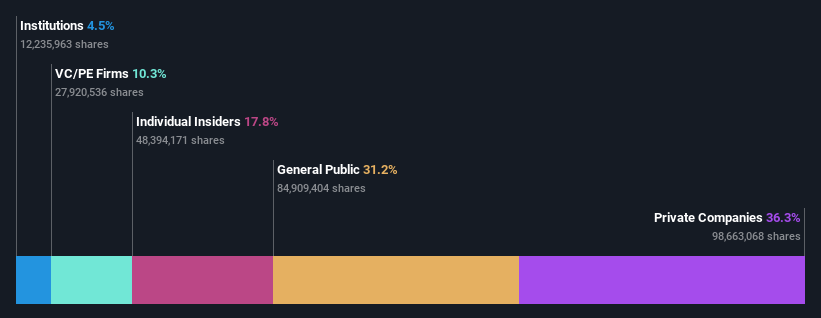Private companies account for 36% of Finbar Group Limited's (ASX:FRI) ownership, while individual investors account for 31%
Key Insights
The considerable ownership by private companies in Finbar Group indicates that they collectively have a greater say in management and business strategy
52% of the business is held by the top 6 shareholders
If you want to know who really controls Finbar Group Limited (ASX:FRI), then you'll have to look at the makeup of its share registry. The group holding the most number of shares in the company, around 36% to be precise, is private companies. Put another way, the group faces the maximum upside potential (or downside risk).
And individual investors on the other hand have a 31% ownership in the company.
Let's delve deeper into each type of owner of Finbar Group, beginning with the chart below.
See our latest analysis for Finbar Group
What Does The Institutional Ownership Tell Us About Finbar Group?
Institutions typically measure themselves against a benchmark when reporting to their own investors, so they often become more enthusiastic about a stock once it's included in a major index. We would expect most companies to have some institutions on the register, especially if they are growing.
Less than 5% of Finbar Group is held by institutional investors. This suggests that some funds have the company in their sights, but many have not yet bought shares in it. If the company is growing earnings, that may indicate that it is just beginning to catch the attention of these deep-pocketed investors. When multiple institutional investors want to buy shares, we often see a rising share price. The past revenue trajectory (shown below) can be an indication of future growth, but there are no guarantees.
Hedge funds don't have many shares in Finbar Group. Kai Xin Guo Pte Ltd. is currently the largest shareholder, with 23% of shares outstanding. Thorney Investment Group Australia Pty. Ltd. is the second largest shareholder owning 10% of common stock, and Calogero Rubino holds about 5.8% of the company stock. In addition, we found that Darren Pateman, the CEO has 1.3% of the shares allocated to their name.
We did some more digging and found that 6 of the top shareholders account for roughly 52% of the register, implying that along with larger shareholders, there are a few smaller shareholders, thereby balancing out each others interests somewhat.
While it makes sense to study institutional ownership data for a company, it also makes sense to study analyst sentiments to know which way the wind is blowing. Our information suggests that there isn't any analyst coverage of the stock, so it is probably little known.
Insider Ownership Of Finbar Group
The definition of an insider can differ slightly between different countries, but members of the board of directors always count. Company management run the business, but the CEO will answer to the board, even if he or she is a member of it.
I generally consider insider ownership to be a good thing. However, on some occasions it makes it more difficult for other shareholders to hold the board accountable for decisions.
Our most recent data indicates that insiders own a reasonable proportion of Finbar Group Limited. Insiders own AU$39m worth of shares in the AU$220m company. This may suggest that the founders still own a lot of shares. You can click here to see if they have been buying or selling.
General Public Ownership
The general public, who are usually individual investors, hold a 31% stake in Finbar Group. This size of ownership, while considerable, may not be enough to change company policy if the decision is not in sync with other large shareholders.
Private Equity Ownership
With an ownership of 10%, private equity firms are in a position to play a role in shaping corporate strategy with a focus on value creation. Some investors might be encouraged by this, since private equity are sometimes able to encourage strategies that help the market see the value in the company. Alternatively, those holders might be exiting the investment after taking it public.
Private Company Ownership
It seems that Private Companies own 36%, of the Finbar Group stock. It might be worth looking deeper into this. If related parties, such as insiders, have an interest in one of these private companies, that should be disclosed in the annual report. Private companies may also have a strategic interest in the company.
Next Steps:
It's always worth thinking about the different groups who own shares in a company. But to understand Finbar Group better, we need to consider many other factors. To that end, you should learn about the 4 warning signs we've spotted with Finbar Group (including 3 which are significant) .
Of course, you might find a fantastic investment by looking elsewhere. So take a peek at this free list of interesting companies.
NB: Figures in this article are calculated using data from the last twelve months, which refer to the 12-month period ending on the last date of the month the financial statement is dated. This may not be consistent with full year annual report figures.
Have feedback on this article? Concerned about the content? Get in touch with us directly. Alternatively, email editorial-team (at) simplywallst.com.
This article by Simply Wall St is general in nature. We provide commentary based on historical data and analyst forecasts only using an unbiased methodology and our articles are not intended to be financial advice. It does not constitute a recommendation to buy or sell any stock, and does not take account of your objectives, or your financial situation. We aim to bring you long-term focused analysis driven by fundamental data. Note that our analysis may not factor in the latest price-sensitive company announcements or qualitative material. Simply Wall St has no position in any stocks mentioned.

 Yahoo Finance
Yahoo Finance 

